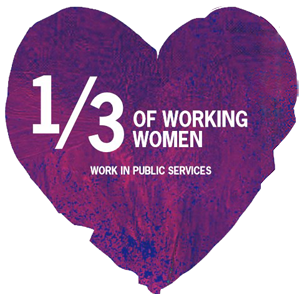The pandemic has highlighted how important and crucial public services in sectors such as early childhood, education, health and social services truly are. It also brought attention to the key role women play in these sectors and in our society as a whole. Women do, in fact, hold the vast majority of the care sector’s jobs.
Women are largely responsible for having kept health, education and early childhood networks operational during the crisis. The personnel in these female-dominated sectors have pulled out every stop to avoid seeing Québec collapse entirely.
A crisis that affects women
 Throughout the pandemic, more women lost their jobs or had to step away from the labour force than men. From the onset of the crisis in March 2020, women’s employment fell by 7% compared to 4% for men, according to Statistics Canada.
Throughout the pandemic, more women lost their jobs or had to step away from the labour force than men. From the onset of the crisis in March 2020, women’s employment fell by 7% compared to 4% for men, according to Statistics Canada.
In Québec, of the 290,000 workers impacted by the crisis, women represent 50% of those unemployed, 90% of those who moved from full-time to part-time employment, and 71% of those who left the workforce entirely.
“The lack of services, particularly places in early childhood educational services, might explain in part the significant proportion of women who left their job,” explains the head of the Committee on the Status of Women at the CSQ, Julie Pinel.
Work-family-study-personal-life balance is increasingly difficult due to existing problems within public services and the pandemic’s effects. “The situation also has a greater impact on women than on men because child raising and caretaking parental responsibilities lie primarily with women,” adds Julie Pinel.
Furthermore, in families where loved ones are in need of care, caregiving responsibilities, duties and involvement rest even today more heavily on the shoulders of women than men.
Fair measures are needed
 Even though the current crisis has been referred to as a she-cession (recession for women) in Canada, the Québec government’s recovery measures are primarily intended for male-dominated sectors, notably construction and transportation.
Even though the current crisis has been referred to as a she-cession (recession for women) in Canada, the Québec government’s recovery measures are primarily intended for male-dominated sectors, notably construction and transportation.
Traditionally, when looking to restore fiscal balance, the government makes cuts to public services, considered as an expenditure, to invest in infrastructure. However, to ensure our economic recovery is fair, the government must invest in public services instead.
This would promote employment for women, who have been hit harder by the pandemic. And given that they are in turn important users of these same services, “women would also benefit from investments in additional services, such as home support for caregivers or the creation of new places in educational childcare services,” explains Julie Pinel.
Moreover, public services are available throughout Québec. Investments in this sector would help support the economy across all regions.
The government must take women into consideration when planning its economic recovery. An adequate response to the current situation is imperative and that necessarily involves public services.
A long history
 In Québec, the foundations of the health and education systems were laid in large part by women. In the past, associated caregiving jobs were carried out free of charge by women, within the family, or through the clergy, mostly by nuns.
In Québec, the foundations of the health and education systems were laid in large part by women. In the past, associated caregiving jobs were carried out free of charge by women, within the family, or through the clergy, mostly by nuns.
In the collective imagination, it seems therefore natural for women to care for others. Despite these tasks having been incorporated in various public services employment categories, the sector remains female-dominated.
Incidentally, one in three working women works in the public sector.
